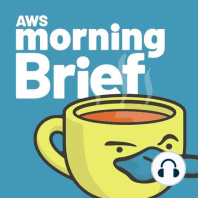1 min listen
Networking in the Cloud Fundamentals, Part 6
ratings:
Length:
16 minutes
Released:
Dec 12, 2019
Format:
Podcast episode
Description
About Corey QuinnOver the course of my career, I’ve worn many different hats in the tech world: systems administrator, systems engineer, director of technical operations, and director of DevOps, to name a few. Today, I’m a cloud economist at The Duckbill Group, the author of the weekly Last Week in AWS newsletter, and the host of two podcasts: Screaming in the Cloud and, you guessed it, AWS Morning Brief, which you’re about to listen to.TranscriptCorey: Knock knock. Who's there? A DDOS attack. A DDOS a... Knock. Knock, knock, knock, knock, knock, knock, knock, knock, knock, knock, knock, knock, knock, knock, knock, knock, knock, knock, knock.Welcome to what we're calling Networking in the Cloud, episodes six, How Things Break in the Cloud, sponsored by ThousandEyes. ThousandEyes recently launched their state of the cloud performance benchmark report that effectively lets you compare and contrast performance and other aspects between the five large cloud providers, AWS, Azure, GCP, Alibaba and IBM cloud. Oracle cloud was not invited because we are talking about real clouds here. You can get your copy of this report at snark.cloud/realclouds. and they compare and contrast an awful lot of interesting things. One thing that we're not going to compare and contrast though, because of my own personal beliefs, is the outages of different cloud providers.Making people in companies, by the way, companies are composed of people, making them feel crappy about their downtime is mean, first off. Secondly, if companies are shamed for outages, it in turn makes it far likelier that they won't disclose having suffered an outage. And when companies talk about their outages in constructive blameless ways, there are incredibly valuable lessons that we all can learn from it. So let's dive into this a bit.If there's one thing that computers do well, better than almost anything else, it's break. And this is, and I'm not being sarcastic when I say this, a significant edge that Microsoft has when they come to cloud. They have 40 some odd years of experience in apologizing for software failures. That's not trying to be insulting to Microsoft, it's what computers do, they break. And being able to explain that intelligently to business stakeholders is incredibly important. They're masters at that. They also have a 20 year head start on everyone else in the space. What makes this interesting and useful is that in the cloud, computers break differently than people would expect them to in a non-cloud environment.Once upon a time when you were running servers and data centers, if you see everything suddenly go offline, you have some options. You can call the data center directly to see if someone cut the fiber, in case you were unaware of fiber optic cables' sole natural predator in the food chain is the mighty backhoe. So maybe something backhoed out some fiber lines, maybe the power is dead to the data center, maybe the entire thing exploded, burst into flames and burned to the ground, but you can call people. In the cloud, it doesn't work that way. Here in the cloud, instead you check Twitter because it's 3:00 AM and Nagios is the original call of duty or PagerDuty calls you, because you didn't need that sleep anyway, telling you there is something amiss with your site. So when a large bond provider takes an outage, and you're hanging out on Twitter at two in the morning, you can see DevOps Twitter come to life in the middle of the night, as they chatter back and forth.And incidentally, if that's you, understand a nuance of AWS availability zone naming. When people say things like us-east-1a is having a problem and someone else says, "No, I just see us-east-1c is having a problem," you're probably talking about the same availability zone. Those letters change, non deterministically, between accounts. You can pull zone IDs, and those are consistent. But by and large, that was originally to avoid having problems like everyone picking A, as humans tend to do
Released:
Dec 12, 2019
Format:
Podcast episode
Titles in the series (100)
Welcome to AWS Morning Brief: Welcome to AWS Morning Brief, the podcast that summarizes the news from the AWS ecosystem--and makes fun of it. by AWS Morning Brief
